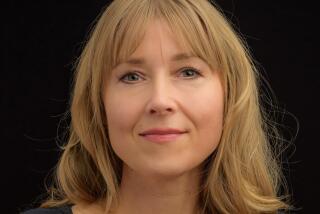She’s True to a Different Lesson of Her Heritage
- Share via
I float along, forgetting what I am, until someone comes along and reminds me: “Abcarian,” they’ll say. “What kind of name is that?”
“Armenian,” I reply, too much a child of American parents to feel a rush of ethnic pride.
It comes up now and then, my ethnicity. In the last couple of weeks, though, it’s been used against me--something I’m not used to.
After I wrote unflatteringly about Dan Quayle, I received a call from a woman who struck me speechless when she told me I made her ashamed to be Armenian.
Doubtless a good Republican, she probably would be appalled to know I never voted for George Deukmejian, either.
Later, I received a patronizing letter about the Quayle column from a man I’d deeply offended. His name was not identifiably Armenian, but that didn’t stop him from wagging his finger at me on behalf of Armenians everywhere.
“The people I know whose last name ends in -ian will agree with me 99 times out of 100,” he wrote. “I am disappointed in you, and you must be disappointed in you. I am sure that your mother and father taught you what is right and wrong.”
Well, they certainly taught me not to loot the local savings and loans, which is more than the Bushes taught their son.
But I guess they also forgot to teach me the proper Armenian positions on day-to-day American politics. Perhaps they were unaware any existed.
Growing up, we knew almost no other Armenian kids, so our background always seemed slightly exotic.
My mother, from English stock (later diluted by Irish and Norwegian blood) that immigrated to this continent in the 17th Century, generously embraced her husband’s ethnicity. She never felt left out when her four children identified themselves or were identified as Armenian.
“It’s the only half that counts,” my father would joke.
We weren’t really all that Armenian, though. No one ever taught us about our cultural heritage. In truth, we probably would not have been receptive students.
We were Americans, Californians, San Fernando Valley kids.
It wasn’t until recently, as a journalist, that I explored my Armenian heritage.
In truth, I was forced to. At my last job, I was adopted by the Detroit Armenian community, a wonderful, hospitable group. They didn’t care that I was only half Armenian. I was one of them.
The Irish-American publisher of my newspaper had warned me in jest not to let the Armenians “get their hooks in too deeply.
“They’ll think they own you. Look what happened to me.”
Nothing, of course, had happened to him, except that he’d made a virtual career of reminiscing in print about his Irish-American boyhood and frequent trips back to the Motherland.
He was right in one sense. There were regular requests and expectations from the Armenian community. It was a warm, sweet and sometimes vexing feeling: invitations to private homes for dinner, just because my last name ends in -ian ; speaking requests for mother-daughter fashion shows, and occasional bruised feelings when I declined.
My publisher, though, had the good fortune to be first-generation American. We of the second generation can’t usually reminisce about those colorful ethnic childhoods.
What little Armenian education I received took place primarily in my grandmother’s Fresno kitchen and centered on food.
Over the years, I’ve watched her hover over the stove, poking at kuftas --lamb-filled meatballs--as they bobbed in chicken broth. We’ve sat at her table, rolling grape leaves around a meat-and-rice filling making the little cigar-shaped morsels called sarma . Now she is joined at the task by my German-English husband, who perfected his rolling technique as a ‘60s counterculturalist.
My grandmother, 87, came to America at age 3.
Like most Armenians of her era--the decimated generation--she never talked freely about the atrocities of the genocide. Her family left before the Holocaust of 1915, in which about 1.5 million Armenians were slaughtered by Turks. My grandfather, who came as a teen-ager and had real horror stories to tell, died before I was born.
Only since I’ve become an adult and have pressed her for her recollections has she opened up about the awful things she knows.
Three years ago, she moved to a local Armenian retirement home. In truth, she has little in common with her neighbors, most of whom do not speak English. Hers was a working-class American life. Her three sons attended college; two became professors.
When I told my grandmother about the woman who said I made her ashamed to be Armenian, she exploded: “You were taught to think for yourself. Politics have nothing to do with being Armenian.”
Then she cursed in Armenian: “Esh!”
I don’t know when or how I learned the word, but I knew exactly what she meant: “Jackass!”



